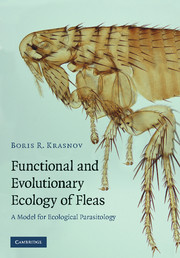
-
Select format
-
- Publisher:
- Cambridge University Press
- Publication date:
- August 2009
- May 2008
- ISBN:
- 9780511542688
- 9780521882774
- 9781107411258
- Dimensions:
- (247 x 174 mm)
- Weight & Pages:
- 1.33kg, 610 Pages
- Dimensions:
- (244 x 170 mm)
- Weight & Pages:
- 0.96kg, 608 Pages
- Subjects:
- Life Sciences, Ecology and Conservation, Entomology
You may already have access via personal or institutional login- Subjects:
- Life Sciences, Ecology and Conservation, Entomology
Book description
Fleas are one of the most interesting and fascinating taxa of ectoparasites. All species in this relatively small order are obligatory haematophagous (blood-feeding) parasites of higher vertebrates. This book examines how functional, ecological and evolutionary patterns and processes of host-parasite relationships are realized in this particular system. As such it provides an in-depth case study of a host-parasite system, demonstrating how fleas can be used as a model taxon for testing ecological and evolutionary hypotheses. The book moves from basic descriptive aspects, to functional issues and finally to evolutionary explanations. It extracts several general principles that apply equally well to other host-parasite systems, so it appeals not only to flea biologists but also to 'mainstream' parasitologists and ecologists.
Reviews
Review of the hardback:'The clear structure and exceptionally fine style of writing in this volume should attract a much wider range of readers than might initially be expected from its title. The book is very definitely up to scratch.'
Source: Bulletin of the British Ecological Society
Review of the hardback:'Some readers may gain most from the early, descriptive chapters of this Olympian review, on aspects such as the obligate blood feeding on higher vertebrates that defines the flea taxon. Others will find both illumination and stimulation in the later essays on various aspects of fleas' functional and evolutionary ecology. The subtitles of these two sections - 'How do fleas do what they do?' and 'Why do fleas do what they do?' - admirably illustrate the unstuffy clarity of the writing, commending the book to students and advanced researchers alike.'
Source: Biologist
Review of the hardback:'… provides an in-depth case study of a host-parasite system, demonstrating how fleas can be used as a model taxon for testing ecological and evolutionary hypotheses. … It extracts several general principals that apply equally well to other host-parasite systems, so will appeal not only to flea biologists but also to mainstream parasitologists and ecologists.'
Source: www.cabi.org
Review of the hardback:'In addition to its handsome cover design and unique subject matter, this book is succinctly written, easy to read and navigate, and has three major strengths: 1) it is logically organized into three general aspects of the functional and evolutionary ecology of fleas, 2) it has an unsurpassed comprehensive bibliography relevant to this subject, and 3) it has a comprehensive cross-index that enhances its function to the reader … This book will predictably be a classic summation of our knowledge of the functional and evolutionary ecology of fleas. It is truly, as the title suggests, a 'model for ecological parasitology', and is a welcome addition to the book shelves of all professionals and students in the fields of ecology, parasitology, and medical entomology.'
Source: Entomological Society of America (entsoc.org)
Contents
Metrics
Altmetric attention score
Full text views
Full text views help Loading metrics...
Loading metrics...
* Views captured on Cambridge Core between #date#. This data will be updated every 24 hours.
Usage data cannot currently be displayed.
Accessibility standard: Unknown
Why this information is here
This section outlines the accessibility features of this content - including support for screen readers, full keyboard navigation and high-contrast display options. This may not be relevant for you.
Accessibility Information
Accessibility compliance for the PDF of this book is currently unknown and may be updated in the future.


